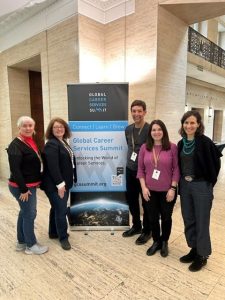|
Getting your Trinity Audio player ready...
|
The Global Career Services Summit (GCSS), held in March, brought together career thought leaders and employers from 18 countries to discuss critical issues affecting career centres and graduate recruitment. The event was hosted by the Careers Group at the University of London in England. Canada was well represented, with five career leaders attending and engaging in discussions on career development, employability and recruitment.
It was an absolute privilege for us to attend the GCSS with our international colleagues. The opportunity to hear current issues, trends and challenges ensures Canada’s career centres are equipped to provide the best advice and services to students and new graduates. Recognizing how fortunate we were to attend this impactful event, we thought others might be interested in our top takeaways from this experience.
Part 1 of this article highlights the GCSS experiences of Tony Botello, Jennifer Browne and Darlene Hnatchuk. Watch out for Part 2, which will share reflections from Felicity Morgan and Jennifer Woodside.
Tony Botelho – Simon Fraser University
When reflecting on my experience at this year’s Summit, the following items stick out most for me:
- We’re all the same and we’re all different
- The importance of context
- The impact of government policy
My first item is a straightforward observation that no matter what country we come from or the size or relative prestige of our institution, we are all dealing with kind of the same stuff. We are all trying to serve our students better, we are all looking at more effective ways of engaging employers, and we are all engaged with institutions and faculty structures that don’t always fully appreciate the nature and complexity of our work. However, how we approach these challenges and what is prioritized can vary greatly.
Which conveniently brings me to my second point: the importance of context.
Put simply, context matters. While it can be tempting to look enviously at all the cool things that are being done at other institutions and hope to replicate them at your institution, it’s important to remember that what might work brilliantly in one place may not be a fit in another. For example, some institutions have substantial alumni support and corporate sponsorship as a foundation for their well-resourced employer relations; that is not the reality of most Canadian career centres. Instead of trying replicate what other institutions are doing, the key is to view these examples as inspiration and to uncover the transferable elements.
“We are all trying to serve our students better … and we are all engaged with institutions and faculty structures that don’t always fully appreciate the nature and complexity of our work.”
As a final item, I cannot ignore the impact of federal government policy on U.K. institutions’ career supports for students. As I understand it, all U.K. institutions are required to survey their graduates at specific intervals and then report on what percentage are in “graduate-level” positions (among other things). While I personally have concerns about a purely metric-driven approach, it has undoubtedly led to greater commitment (including resources) to campus career centres. From what I observed, this is a period of growth and innovation at several schools.
Jennifer Browne – Memorial University
The program and discussion were thoughtful and provocative. It was energizing to examine so many topics with colleagues from numerous countries. While hard to narrow down, here are my top three takeaways.

1. Skills-based awareness/recruitment
The skills discussion has been prominent in higher education in recent years. Whether it’s a skills gap or – as many argue – a skills awareness gap, the fact remains that institutions continue to explore ways to increase students’ awareness of the skills gained both in and outside the classroom. At the GCSS, many presenters shared the concept of pre-skilling. This refers to a framework of eight foundational skills that support the development of other skills, called Skills-for-Skills. The skills conversation is ongoing in most countries, and will likely continue among key stakeholders including students, educators, employers and governments.
2. Career development curriculum integration
This is not a new theme globally but it continues to dominate many career discussions in higher education. Embedding career development into the curriculum ensures every student benefits. This is a higher priority in some universities and countries, and different approaches have been tried. As Tony referenced, some of this has been driven by political agendas and outcome-based funding models. Greater accountability for career development and graduate outcomes has required post-secondary institutions to integrate career development into curriculum. It is fascinating to learn how universities in various countries have responded to this call.
3. The impact of AI on career services
The impact of artificial intelligence (AI) tools such as ChatGPT is one of the hottest topics in higher education right now. How will AI affect and support campus career services and career planning more broadly? When I asked ChatGPT, it told me AI will have a profound impact on career development, including on personalized career guidance, resume optimization and skills assessment.
GCSS attendees raised many questions about these technologies and recognized pros and cons of such tools. What was agreed upon by all humans attending the GCSS is that AI will have a significant influence on post-secondary career centres, transforming the way they operate and the services they provide.
Darlene Hnatchuk – McGill University
1. Above, Jennifer shared some of the ways that institutions have been supporting students to recognize the skills they develop during their university experience. The flip side is that employers are struggling to hire for skills, rather than the traditional hiring approach focusing on duties and credentials.
Drawing on a McKinsey article on skills-based hiring, we heard that skills validation, sourcing candidates and assessing worker effectiveness are common top challenges for employers. The push to remove “degree requirements” from job postings is often promoted as a way to increase diversity among candidates. However, on a practical level, this requires thoughtful identification of required skills, an ability to fairly assess those skills and the buy-in of hiring managers, which explains why not all employers have shifted this way.
2. Equity, diversity and inclusion (EDI) was an underlying theme at the Summit. Throughout panels and discussions, we heard and shared some great practices and ideas. Among them: One UK university requires recruiting employers to sign an agreement outlining their expectation that the employer will inform students about their EDI initiatives. Another organization’s practice was to require all staff to undertake unconsciousness bias training. One speaker introduced the concept of “culture added” to increase our diversity, rather than focusing on “culture fit” – i.e. recruiting people who would add to your organizational culture with their differences.
Yet the comment that most resonated with me was when one employer with significant experience both in career services and in recruitment boiled it down to this: Focus on (employee) potential if you are serious about diversity.
Don’t miss Part 2 of this article in July, where Felicity Morgan and Jennifer Woodside will dive into the impact of brain development on career decision-making, thriving in the future of work and more.




